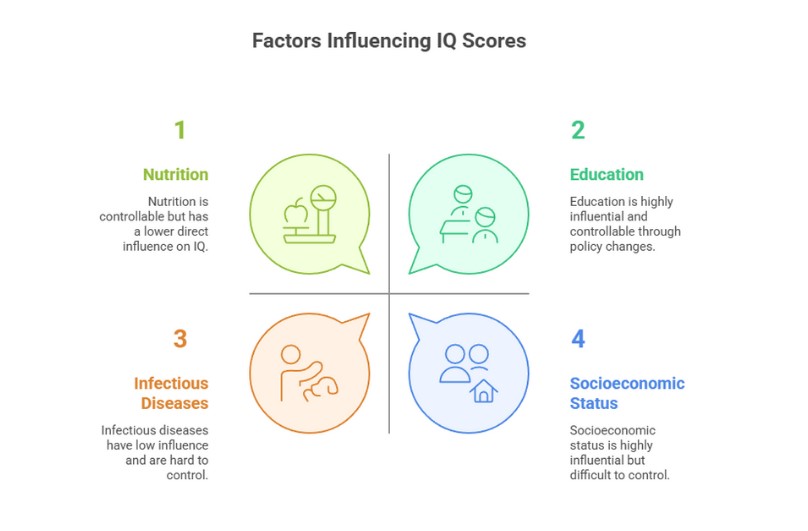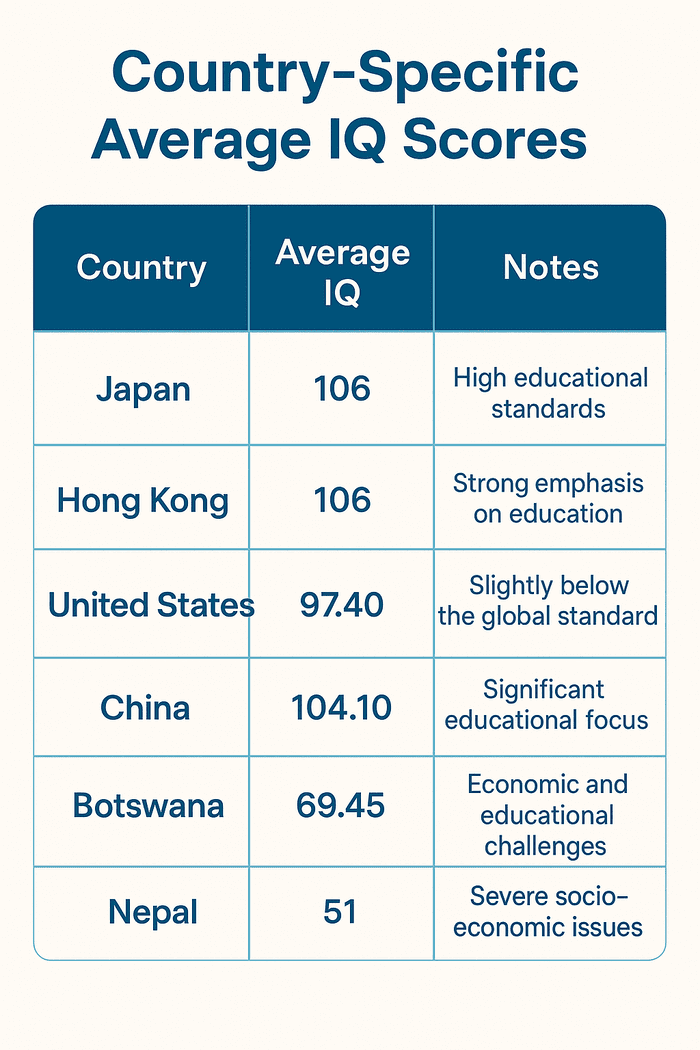
Share Post:
Intelligence Quotient (IQ) offers a standard way to compare cognitive abilities among individuals of similar age. Over time, discussions about IQ have become more nuanced, examining not only how scores are calculated but also what these numbers truly mean in different social and cultural settings.
Throughout this article, readers will learn what counts as an average IQ, how scores can shift based on age and location, and the various debates surrounding the usefulness and fairness of these measures.
As people look deeper into the topic, it becomes clear that IQ is influenced by a complex web of factors, from genetics and environment to regional differences and societal norms.
By examining patterns and outliers in IQ data, the article sheds light on the broader relevance of IQ in understanding human intelligence, as well as the limitations of relying solely on these scores.
Table of Contents
ToggleKey Takeaways
- IQ measures cognitive abilities in relation to one’s age group.
- Average IQ scores can differ by age, location, and demographic factors.
- The significance of IQ is shaped by both scientific analysis and ongoing debates.
Definition of IQ and Its Measurement
What Does IQ Measure?
IQ, or Intelligence Quotient, measures intellectual abilities and cognitive potential. It assesses reasoning, comprehension, and problem-solving skills using different tools. These skills are considered important in academic and day-to-day functioning.
IQ is often used as a psychological indicator of cognitive strengths and potential challenges. While the focus is on intellectual performance, it does not encompass all types of intelligence, such as creativity or emotional intelligence.
Explanation of IQ Tests
Modern IQ tests, including assessments like the Wechsler Adult Intelligence Scale and the Stanford-Binet Intelligence Scale, report scores with a mean of 100 and a standard deviation of 15. This means most people fall between 85 and 115.
Below is a basic IQ score classification table:
| Score Range | Classification |
|---|---|
| Below 70 | Intellectual Disability |
| 70–84 | Below Average |
| 85–115 | Average |
| 116–129 | Above Average |
| 130–144 | Gifted |
| 145+ | Genius |
Tests such as the Differential Ability Scales and Kaufman Assessment Battery for Children offer cognitive assessment for specific age groups.
Role of Tests in Determining IQ
Standardized tests are essential for reliable IQ measurement. Tests like the Wechsler Intelligence Scale, Stanford-Binet test, and Cognitive Assessment System provide uniform testing conditions, allowing comparison across individuals and populations.
Psychometricians design these instruments to ensure objectivity and accuracy. Standardization involves administering the test to a large, representative sample to set norms. This enables meaningful interpretation of individual scores and supports wide use in both educational and clinical settings.
Average IQ Score

What is the Average IQ Score and How is it Classified?
The average IQ score is set at 100, serving as a reference point. Most people have scores between 90 and 109, which is considered the average range for intelligence. This comparison accounts for a person’s age, so results are more meaningful and accurate across age groups.
Scores generally follow a normal distribution (bell curve), placing about 68% of individuals within a certain range around the average. Individuals with an average IQ display reasoning, verbal skills, and problem-solving abilities typical for their age group.
Standard Deviation in IQ scores
A standard deviation of 15 is standard for most modern IQ tests. Scores between 85 and 115 are considered within one standard deviation of the mean. This range includes roughly two-thirds of the population.
Standard deviation helps explain how typical or rare a certain score is compared to others. For example, a score much lower than 85 or higher than 115 is uncommon and may indicate either below average or above average mental age and cognitive abilities.
Classification of IQ scores
IQ scores can be grouped based on common classifications. Each range has significance for cognitive abilities and development.
| IQ Score Range | Classification | Notes |
|---|---|---|
| 70 and below | Low IQ (Intellectual Disability) | May indicate learning difficulties |
| 90 – 109 | Average Intelligence | Majority of people are in this range |
| 110 – 119 | High Average IQ | Higher than typical cognitive abilities |
| 120 – 139 | Above Average IQ | Often considered bright or very capable |
| 140 and above | Genius Level IQ | Exceptional problem-solving and reasoning |
These groupings help to understand where someone falls within the IQ spectrum and what their score may represent. IQ charts and classifications make it easier to interpret individual results against the broader population.
What Factors Influence IQ Scores?
IQ scores reflect the combined influence of genetics and environmental circumstances, with neither element acting in isolation. Genetics provide a starting point for cognitive ability, but everyday experiences and living conditions significantly shape test outcomes.
Key influences include:

Children growing up with limited resources or chronic health issues may see different IQ outcomes than those with supportive environments and good health.
Definition of the Flynn Effect
The Flynn Effect describes the steady rise in IQ scores around the world through the 20th century. Researchers highlight a few main drivers behind this trend:
- Enhanced education systems and curricula
- Greater access to healthcare and vaccinations
- Improvements in childhood nutrition
- Everyday exposure to more complex problem-solving and technology
These shifts demonstrate that rising IQ scores are closely tied to widespread social and environmental progress. IQ remains responsive to changes in living standards, education, and overall health.
Average IQ by Age: Lifespan Variations

How IQ Scores Change With Age
IQ scores do not remain constant across the lifespan. While the average is set at 100, mental abilities and cognitive abilities fluctuate due to factors like education, experience, and neurological development.
For example, verbal reasoning, logical reasoning, and information-processing speed may strengthen or decline at various points in life. Emotional intelligence and crystallized intelligence can grow with life experience, reflecting the dynamic nature of intellectual potential.
Typical IQ Scores in Different Age Brackets
| Age Group | Average IQ Score | Notable Trends |
|---|---|---|
| 16–17 | 108 | Higher averages observed in teens |
| 18–19 | 105 | Slight decrease from teenage years |
| 20–24 | 99 | Drop in early adulthood |
| 25–34 | 97 | Early career, lowest average observed |
| 35–44 | 101 | Returns closer to general average |
| 45–54 | 106 | Cognitive maturity increases |
| 55–64 | 109 | High point, growing experience |
| 65–69 | 114 | Higher average in later years |
| 70–74 | 119 | Peak before decline |
Cognitive Development Across Lifespan
Cognitive development spans multiple stages. In childhood and adolescence, memory, mathematical skills, and foundational cognitive ability grow rapidly. Development continues through early adulthood, although some mental ability measures may dip as formal education ends.
During midlife, crystallized intelligence—knowledge and skills accumulated over time—often compensates for any decline in processing speed.
With age, accumulated wisdom, creativity, and reasoning ability may lead to peaks in later life before a gradual decrease in some domains.
Age-related differences highlight that intelligence includes both changeable and enduring elements influenced by diverse factors across the lifespan.
Global IQ Statistics and Disparities
What is the Global Average IQ?
Recent international assessments estimate the global average IQ is approximately 89, which is below the standard IQ test set point of 100. Some regions and countries exceed this average significantly, especially those with strong educational systems and favorable socio-economic conditions.
Notably, countries like Japan and Hong Kong often post average IQs around 106, highlighting the influence of various cultural and structural factors.
Factors Causing IQ Variation Globally
Differences in IQ scores from country to country are shaped by a combination of factors:
- Education quality plays a significant role in cognitive development.
- Socioeconomic status affects access to necessary resources for intellectual growth.
- Healthcare standards influence both early and lifelong brain development.
- Nutrition, especially in childhood, is crucial for optimal intellectual potential.
These elements frequently interact, resulting in varied national and regional IQ averages.
Examples of Country-Specific Average IQ Scores

These examples illustrate how intelligence levels can differ sharply across nations. Scores can reflect not just education systems but also public health, nutrition, and economic stability—demonstrating the complexity of comparing global intelligence levels using only a single metric such as IQ.
US IQ Averages
What is the Average IQ in the United States?
The average IQ in the United States is about 97.43. This number is slightly below the standardized mean of 100 found in IQ testing.
Such a difference highlights the varied effects of social factors, including economic status, healthcare access, and educational attainment, on intelligence measures.
These influences play a crucial role in the cognitive development seen across the population.
How do State-Wise IQ Scores Compare?
IQ scores do not remain consistent across all states. For example:
| State | Average IQ |
|---|---|
| Massachusetts | 104.3 |
| New Hampshire | 104.2 |
| North Dakota | 103.8 |
| Vermont | 103.8 |
States like Massachusetts and New Hampshire consistently top national averages, while other states report lower averages.
Key contributors to these differences include the quality of local schools and the availability of educational and medical resources. These statistics demonstrate how public policy and state investments can affect cognitive measures.
What Influence Does Education Have on US IQ Averages?
Education is a major factor shaping IQ results in the US. Access to strong academic institutions is linked with higher average IQs in several regions. Improved education leads to gains in IQ scores, reflecting broader gains in reasoning and learning ability.
The Flynn Effect—an observed rise in average IQs over generations—underscores the impact of enhanced education and improved living standards. Families and communities that invest in learning resources help foster higher cognitive outcomes.
IQ Classifications Beyond Averages
What are Examples of High IQ Classifications?
High IQ classifications stretch beyond the average range, starting around a score of 130. This is often described as “very superior” or “gifted” intelligence.
Scores of 140 and above are commonly associated with the “genius” classification, highlighting a level of cognitive ability that is exceptionally rare.
These classifications illustrate how IQ tests assign labels to patterns of exceptional intellectual performance.
Examples of high IQ classification terms:
- High IQ: Typically 130+
- Genius IQ: 140+
- Superior Intelligence: 125–130
A number of systems exist, but this kind of classification generally signals the presence of strong reasoning, problem-solving, and advanced learning abilities.
Percentage Distribution of Higher IQ scores
The occurrence of high and superior intelligence is rare compared to the general population. Most individuals fall within the average range, while only a small percentage achieve higher scores.
| IQ Score | Classification | Approximate Percentage |
|---|---|---|
| 130+ | High IQ | ~2% |
| 140+ | Genius IQ | <0.1% |
| 125–130 | Superior Intelligence | ~5% |
| 85–115 | Average Intelligence | ~68% |
These statistics show that while superior and genius-level scores are possible, they are not common.
Mensa and Elite Scores
Mensa is a well-known organization for those with high intellectual ability. Eligibility typically requires scoring in the top 2% of the population, often an IQ of 132 or above on approved tests. This selective threshold ensures membership is limited to individuals with proven high cognitive skills.
Being part of Mensa or achieving a score considered “elite” can offer opportunities for unique social and intellectual engagement. Members often participate in problem-solving groups, discussions, and special interest societies, illustrating the real-world applications of such IQ classifications.
The Gender Aspect in IQ Scoring
How Do IQ Scores Vary Between Genders?

IQ scores for men and women are remarkably close, with average scores typically around 100 for both groups.
Some findings indicate women average about 97, while men score around 99. This difference is minimal and does not point to any substantial gender-based advantage.
Key Points
- Average IQ for men: ~99
- Average IQ for women: ~97
- Both genders cluster around a standard mean
Trends and Variations Across Demographics
The differences between genders are consistent with natural variations found in any large group. About 68% of people, regardless of gender, score between 85 and 115, which forms the central portion of the IQ bell curve.
Influencing Factors:
- Educational background
- Socioeconomic status
- Access to healthcare
A simple comparison table:
| Gender | Mean IQ | Common Range (68%) |
|---|---|---|
| Men | 99 | 85–115 |
| Women | 97 | 85–115 |
Insights From Gender-Focused IQ Studies
Research highlights that any observed differences in IQ between genders are generally small and can often be explained by outside influences rather than innate ability.
Factors such as environment, education, and upbringing play significant roles in shaping cognitive outcomes.
- Both men and women perform similarly in broad measures of intelligence.
- Variations, when present, are more likely linked to context and social factors rather than gender itself.
- Studies reinforce the view that intelligence is not inherently gendered.
The Debate on IQ and Life Success
How Does IQ Relate to Life Success?

IQ, as measured by standardized tests, reflects certain cognitive abilities such as reasoning and problem-solving.
While higher scores can open academic doors, intelligence expressed through creativity, emotional awareness, and personal skills frequently matters just as much in professional and social settings.
Many individuals thrive by leveraging attributes not captured by traditional IQ testing.
Correlation Between IQ and Academic Achievement
Numerous studies reveal a consistent pattern: students with higher IQ scores typically excel in standardized academic assessments.
| IQ Level | Typical Academic Outcome |
|---|---|
| Above 100 | Higher grades, advanced classes |
| 100 | Average performance |
| Below 100 | Increased academic challenges |
Standardized tests, such as the Stanford-Binet, primarily measure reasoning and memory, aligning closely with classroom learning objectives. However, the link between IQ and success becomes less robust outside the academic environment.
Limitations of IQ As a Predictor of Success
A high IQ does not guarantee accomplishment in career or life. Emotional intelligence, adaptability, resilience, and social skills are often more valuable in real-world success than cognitive ability alone.
Prominent leaders and entrepreneurs frequently attribute their achievements to creative thinking and persistence rather than raw intellectual power.
Historical efforts to use IQ as a societal filter—such as in the eugenics movement—reflected a narrow view of intelligence.
These initiatives led to unjust outcomes and unfairly labeled groups as “feeble-minded,” which has since been widely discredited.
Broader Influences on Personal Outcomes
Life success arises from a combination of factors. Socioeconomic status, environment, education access, and even nutrition significantly influence opportunities.
Key Influences:
- IQ: Supports academic progress
- Emotional Skills: Foster relationships and adaptability
- Socioeconomic Status: Determines resources and opportunities
- Health: Impacts cognitive and physical performance
External support and personal background often play just as crucial a role as measured intelligence. Opportunities for growth may be limited for those lacking resources, regardless of cognitive potential.
Regional and Demographic Differences in IQ
How Do Regional Factors Affect IQ Scores?
Regional IQ differences can be traced to local factors like quality of education, healthcare access, and economic stability. Regions offering more educational resources and higher literacy rates often see elevated average IQ scores.
A table below summarizes some regional IQ variations:
| Region/Country | Average IQ | Notable Factors |
|---|---|---|
| Massachusetts | 104.3 | Strong educational institutions |
| New Hampshire | 104.2 | Proximity to key universities |
| North Dakota | 103.8 | Stable educational resources |
| China | 104.10 | Educational reforms and rapid economic growth |
| Botswana | 69.45 | Educational and healthcare challenges |
| United States | 97.43 | Significant interstate variation |
| Global Average | 89 | Large variation between countries and regions |
Socioeconomic factors have a major impact as well. Areas with higher income levels and better infrastructure tend to provide improved nutrition and learning environments. This, in turn, supports cognitive development and helps raise the average IQ. Conversely, regions with lower literacy rates and underfunded schools often face barriers that can depress IQ scores.
Cultural influences also shape performance on IQ tests. Societies that encourage skills like logic, reasoning, and critical thinking may help individuals perform better. Engagement with challenging problem-solving activities at home and in school can further support cognitive skills, while limited exposure may reduce these advantages.
Wrapping Up: The Multifaceted Nature of IQ
IQ is shaped by a mix of genetics, environment, education, and culture. While it measures certain cognitive abilities, it only captures part of the broader landscape of human intelligence. Interpretation of IQ results should account for factors such as age, background, and varied experiences.
Key considerations:
- Scores are not fixed—they can reflect situational factors.
- Not all abilities are measured by IQ tests; creativity and social skills are also important.
- Average IQ typically centers around 100, with about 68% of people falling between 85–115.
| Aspect | Influence on IQ |
|---|---|
| Genetics | Moderate |
| Environment | Significant |
| Education | Strong |
| Culture | Variable |
Frequently Asked Questions
Several factors can impact IQ scores, including:
- Educational background
- Socioeconomic status
- Nutrition
- Training or familiarity with test formats
- Stress and mental health at the time of testing
Environmental factors and access to resources also play roles.
References:
- What Is the Average IQ? Normal Ranges, Chart, Uses, Scores
- What’s the Average IQ? – Verywell Mind
- IQ classification – Wikipedia
- List of Average IQ in Every State of the USA
- What Is a Genius IQ Score on an IQ Scale? – Verywell Mind
- The Average IQ: What It Is and How It’s Measured – Psych Central
- What Is Considered a High IQ, What’s Average, What Results Mean
Related Posts:
- Factors And Multiples For Kids: Simple Rules And Games
- Who Invented Math: History, Facts and Table of Numerals
- 8 Fun Activities to Practice Fractions and Mixed…
- What Are BODMAS, BIDMAS, and PEMDAS? A Simple Explanation
- What is a Point in Geometry? Definition and Examples
- How to Teach Addition to a 7-Year-Old – Games and…











